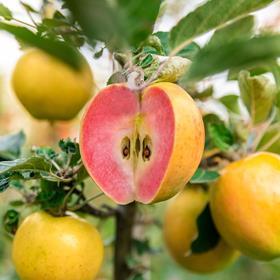
Favourable weather conditions across key Southern Hemisphere growing regions have resulted in a strong 2021 season for Kissabel apples.
Kissabel is the brand that identifies the different varieties of coloured-flesh apple, from pink to intense red. Partner growers in Australia, South Africa, New Zealand, Chile and Argentina have all reported excellent internal colour, good average sizes and outstanding taste.
This follows the positive Northern Hemisphere campaign last Autumn and is an encouraging sign for the Kissabel variety’s prospects.
Rowan Little, general manager of Montague, said this season’s harvest has been one of the best of recent years, thanks to a cooler-than-normal summer and above-average rainfall.
“Kissabel has been no exception. At our new Bill’s Orchard Gate store, not far from Melbourne, we tested the new apples with the local community and organised orchard tours. Feedback was positive in all areas: people were enthusiastic about the coloured internal flesh,” explained Little.
Montague organised an intensive marketing campaign to promote Kissabel, which saw educational material provided to consumers in-store, as well as free packs for media and customers, and professional photographs for use on social media.
In South Africa, flowering was later due to the cooler weather, leading to unexpected production peaks.
“Overall, this year flowering was almost a couple of weeks later than the previous year, so cropping was also postponed,” Tanith Freeman, product development manager of Dutoit (South Africa), explained.
“However, the later varieties were on schedule, so we found ourselves facing production peaks. In fact, the ripening period varies across cultivars.
“In South Africa, the red-skin varieties are best suited to the terrain, while the yellow or orange-skin cultivars tend to ripen more quickly. We’re still in a pre-commercial phase for these new varieties, but we believe the prospects are excellent, and we’re actually planning sales tests in Western Cape province. This will give us important pointers to the potential clientele,” added Freeman.
The production season has also come to an end in New Zealand, Chile and Argentina, where the Kissabel cultivation trials have returned promising results.
Paul Paynter, general manager of Yummyfruit (New Zealand), which is now in its second year of Kissabel trials, said the company still needs to verify some of the fruit’s characteristics, but that the programme was deemed “a winner”.
Emmanuel de Lapparent, manager of the IFORed breeding programme, said the Southern Hemisphere season has been a real success.
“The IFORed programme is now moving on to the next step with the first commercial plantings planned in Chile and Australia, our confidence further increased by the great results from the last European Kissabel campaign. We are enthusiastic about the outlook for the future,” he concluded.






No comments yet